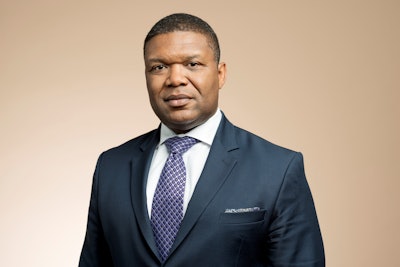It’s August and many colleges and universities continue to pivot or weigh the risk that come with re-opening this fall, during a pandemic. Without a vaccine, most infectious disease experts say that a plan to test every few days for COVID-19 is the safest way for institutions to bring their students back to campus. But it’s also a costly venture that few of them say they can afford to provide, among them are historically Black colleges and universities (HBCUs).
On Wednesday, Thermo Fisher Scientific, the world’s largest maker of scientific tools, announced a project to support testing, at no-cost, to the nation’s HBCUs, including establishing national HBCU testing centers to process COVID-19 tests and provide timely results throughout the academic year.
 Fred Lowery, Thermo Fisher Scientific
Fred Lowery, Thermo Fisher ScientificThrough an initiative called “The Just Project,” named after pioneering cell biologist Ernest Everett Just who served on the Howard University faculty for more than three decades, Thermo Fisher plans to donate $15 million in diagnostic instruments, test kits and related supplies. The multi-billion-dollar company will also provide technical assistance to HBCUs that want to establish or expand their laboratories to provide regular on-campus COVID-19 testing. Five HBCUs—Howard University, Morehouse School of Medicine, Meharry Medical College, Xavier University of Louisiana and Hampton University—will be the first to receive donations. Their laboratories, along with those at other Black colleges and universities, will obtain samples on their campuses. Then samples will be collected from HBCUs and shipped to their assigned testing center. Over the next few weeks, more institutions are expected to join the project as national testing hubs. These campus labs can be operational “as early as next week,” said Fred Lowery, senior vice president and president, Life Sciences Solutions and Laboratory Products at Thermo Fisher.
With a new and uncertain fall semester already underway for many HBCU campuses, Lowery said he continues to spread the word about The Just Project and the access it provides to COVID-19 testing for populations who have been hard hit by the pandemic and the coronavirus.
 This drive-through testing site at Meharry Medical College, in a Black neighborhood, opened in March. Photo Credit: Ken Morris/Meharry Medical College
This drive-through testing site at Meharry Medical College, in a Black neighborhood, opened in March. Photo Credit: Ken Morris/Meharry Medical College“HBCU presidents have been incredibly supportive,” he said, and so far, “about 30% have shown interest.”
Dr. James E.K. Hildreth, the president and CEO of Meharry Medical School in Nashville, Tenn., said he has been fielding calls and speaking with fellow HBCU presidents about the testing opportunity that could save them thousands of dollars and help mitigate an outbreak.
“I anticipate that buy-in will grow,” Hildreth said. Early in the pandemic, he pushed to bring free COVID-19 testing to overlooked communities of color in Nashville that were most at risk for contracting the virus. Now, he said that reach will include all HBCUs and provide a training ground for his students long after COVID-19.
“This partnership with Thermo Fisher and the other HBCU medical schools is pretty amazing,” said Hildreth. “[Thermo Fisher] wants to make sure that Black colleges and universities have the same ability to bring their kids back to campus safely as majority schools do.”
Since the early months of the COVID-19 pandemic, testing for the coronavirus in the U.S. has been problematic and worrisome. Today, testing levels are dropping even as infections remain high and the death toll in the country rises by more than 1,000 a day. Long wait times for results have been partly to blame. The Waltham, Mass.-based Thermo Fisher says that it has the capacity to produce more than 10 million tests per week.
 Dr. James E.K. Hildreth with testing workers.
Dr. James E.K. Hildreth with testing workers.For some HBCUs, the capacity to provide COVID-19 testing for their students, faculty and staff was a huge factor that determined whether they would reopen for in-person classes or go virtual. After releasing a carefully crafted reopening plan in early June, on August 11, Morgan State University in Baltimore Md., for example, announced plans for a virtual fall semester and limited on-campus operation and housing. The University said its shift followed the release of a recent study from Yale University indicating that college students would need to be tested every two to three days for their institutions to safely reopen. Forging ahead, the historically Black Delaware State University has set a high bar when it comes to campus testing. When it reopens on August 25, DSU is counting on its rigorous COVID-19 testing model and a “quarantine dorm” to help it make a safe passage through the fall semester. Assurance is also coming from its partnership with the new nonprofit Testing for America, which will provide free, regular coronavirus tests for students, faculty and staff and return results in 24 to 34 hours.
“The pandemic has disproportionately affected the Black community, and historically Black colleges and universities have taken a leadership role in making testing available in order to safely reopen this fall,” said Lowery. “These schools play an important role in closing the achievement gap in America and consistently train talented STEM professionals who are invaluable to companies like ours seeking to attract top talent and build a more inclusive workplace. Given the value we place on recruiting diverse talent, we have also committed to hiring at least 500 students from these institutions over the next three years.”
Added Dr. Wayne A. I. Frederick, president of Howard University: “Historically Black colleges and universities have produced talented doctors, public health experts and engineers, many of whom are contributing to the fight against COVID-19,” he said. “We are grateful to Thermo Fisher for supporting a testing center on our campus, which will allow us to continue to monitor the health of our academic community.”


















